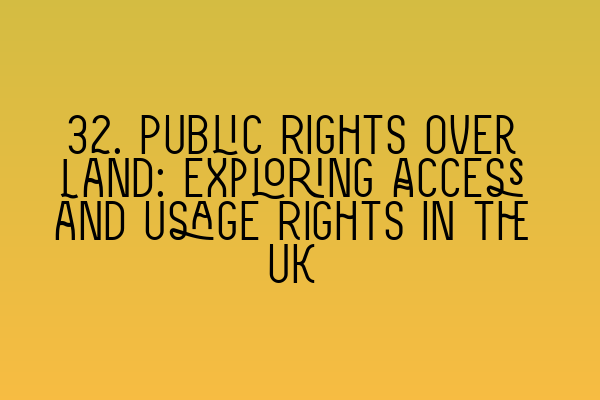Public Rights over Land: Exploring Access and Usage Rights in the UK
Introduction
In the United Kingdom, public rights over land play a vital role in ensuring equitable access and usage of various spaces. Understanding these rights is crucial for property law practitioners and those seeking legal advice in matters pertaining to land ownership and usage. This blog post aims to provide an insightful overview of public rights over land in the UK, exploring the different types of access and usage rights granted to the public.
Access Rights
Access rights refer to the ability to enter and pass through certain areas of land. These rights allow individuals to enjoy and explore the natural beauty of the countryside, access public footpaths, and engage in recreational activities. Access rights are primarily governed by legislation such as the Countryside and Rights of Way Act 2000, which aims to protect and enhance public access to the countryside.
One common type of access right is the right to roam, which grants individuals the freedom to walk and explore designated areas of open land. This right is particularly significant for hikers, nature enthusiasts, and those seeking to escape the hustle and bustle of city life. Understanding the legal framework surrounding the right to roam is essential for anyone planning outdoor activities in the UK.
Usage Rights
Apart from access rights, there are also various usage rights granted to the public in certain circumstances. These rights allow individuals to utilize land for specific purposes, which can range from sporting activities to commercial ventures.
One example of usage rights is the right to fish in certain rivers or lakes. Fishing rights are typically governed by specific agreements or local bylaws that regulate the fishing activities and the conservation of fish populations. It is important to understand these regulations to ensure compliance and to prevent any legal disputes when engaging in fishing activities.
Furthermore, some areas of land may have public rights for recreational purposes, such as horse riding or motorcycling. These rights are typically subject to local regulations and restrictions to safeguard the interests of both the public and landowners. Being aware of such regulations will help individuals enjoy their recreational activities while respecting the boundaries set by the law.
Public Rights and Landowners’ Responsibilities
While public rights over land provide invaluable opportunities and access for individuals, it is essential to strike a balance between these rights and the responsibilities of landowners. Landowners have the right to enjoy their property and protect it from unauthorized use or damage. Therefore, it is crucial for the public to respect the restrictions and boundaries set by landowners when exercising their access and usage rights.
Conclusion
Understanding public rights over land is vital for both property law practitioners and individuals seeking legal advice related to land ownership and usage. From access rights that allow individuals to explore the countryside and enjoy recreational activities, to usage rights that permit specific uses of land, the UK upholds a comprehensive legal framework to ensure equitable access and responsible land usage.
To further enhance your knowledge in this area, you may find it beneficial to explore additional resources and courses offered by SQE Property Law & Land Law. They provide comprehensive preparation courses for the SQE exams, along with practice quizzes and mocks to help you excel in your legal career. You can find more information about their offerings by visiting their website:
– SQE 1 Practice Exam Questions
– SQE 1 Practice Mocks FLK1 FLK2
– SQE 2 Preparation Courses
– SQE 1 Preparation Courses
– SRA SQE Exam Dates
By staying informed about public rights over land, you can effectively navigate legal issues and ensure a harmonious relationship between public access and landownership.
